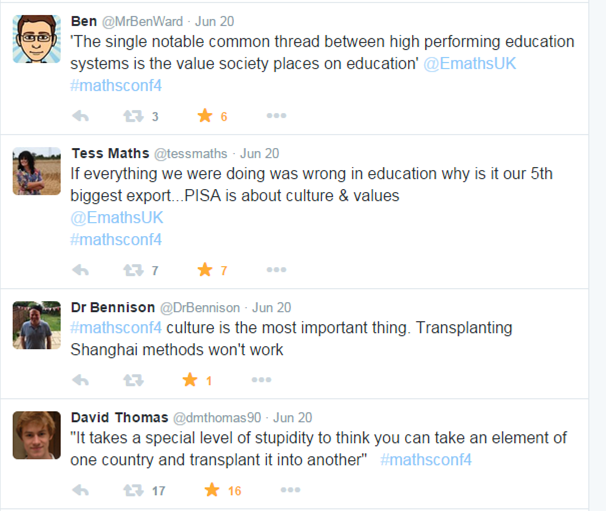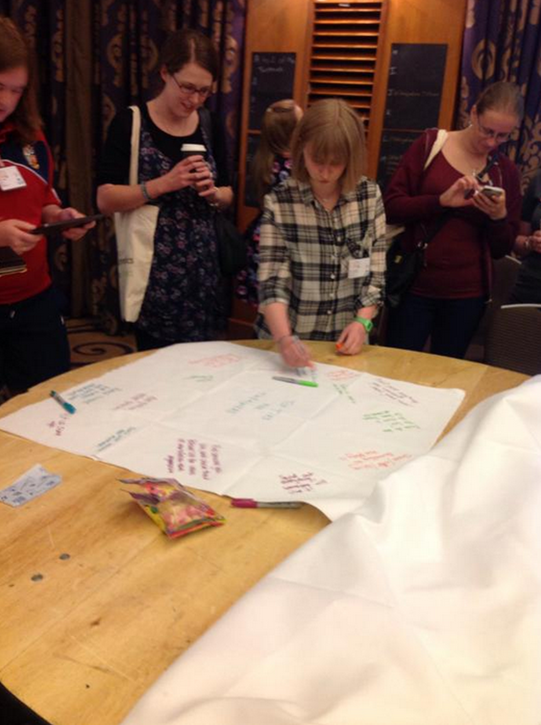In answer to this tweet… definitely not me! Of the three of us who actually attended, both Jo and Amir beat me to posting their blogs, which gives me the dubious honour of third place. Travelling all the way to London for this conference was definitely worth it, but really took it out of me, with the consequence that I spent from 4pm until 8pm in bed yesterday and couldn’t face blogging for the two hours of evening I actually had before going to bed properly.
Anyway, I thought I’d better get a bit of a blog done before I forget everything that happened – I may do some more in-depth blogs on individual workshops later on as the mood takes me.
I’ll also add that I didn’t spend loads of time taking pictures, unlike last time. Every time I wanted to capture something, there was a picture of it popping up on Twitter anyway, so I didn’t bother. Also, other people’s commentary is far more interesting to follow. I also managed to not save my notes from the second half of the day (flipping Polaris Office app) so I’m running on memory for most of it.
First of all – the venue. Wow!
Also, easy to find and close to the Tube, which got bonus points from a non-native.
We started off with another little chat from Andrew Taylor from AQA, followed by a session of speed dating. I cheated a bit this time – I forgot my algebra tiles, so just shared the great Flash Maths, which I’ve been using lots recently. I found out about the superb Educreations app, which lets pupils create their own videos on tablets (if only we had them…sigh) and did a bit of paper folding with the colleagues on my table. My final star-crossed date showed me a fantastic cupcake takeaway homework idea, which I’ll share once he’s emailed me the link.
Mark’s introductory speech was entertaining and thought-provoking as usual, with a forensic look at PISA and what actually goes on in high-performing jurisdictions. Here are a few of my favourited sound-bytes from Twitter:

One thing that really stuck with me was Mark’s story about a headteacher who’d visited a school a few miles away and seen some ideas he liked, but realised that he would have to adapt these ideas to work in his setting, and that they wouldn’t just work “off the peg”. This made me think a few things:
- Yes, I do this all the time, and so do loads of other teachers. It’s rare that you can take a resource and just use it as it is, as it’s been developed with a specific group of pupils in mind, and the chances are, those pupils didn’t respond to the lesson or resource in exactly the same way that yours will.
- I’ve done this a lot this year with our work on the Mastery Pathway – I spent a lot of time over the summer writing a scheme that would work for our pupils, even though a lot of the groundwork had already been laid for us. I’m now re-adapting based on our experiences this year, and the chances are that we’ll end up with a scheme superficially similar but hugely varied to the other schools in our area running exactly the same programme.
- Do all these resource packages bought into schools actually help? Having spent the last two weeks clearing out my storeroom (the physical one at the back of my classroom), I’ve thrown away a couple of bespoke packages we bought in years ago and didn’t really use, because they weren’t properly fit for purpose with our pupils.
- We as a profession need to be really, really careful about messages we get from the media and elsewhere about the efficacy of intervention strategies and “new” teaching methods.
If you’ve got a spare hour or so, this paper (Why do East Asian children perform so well in PISA? An investigation of Western-born children of East Asian descent), mentioned in Mark’s talk and convenientlytweeted by Tim Stirrup, is really worth a read.
Workshop 1 – From Euclid to You (@eL_Timbre)
I signed up for Emma’s workshop because it seemed like a great opportunity for a bit of a geek-fest – I love mathematics history, I love books and was intrigued by the Doctor Who theme. I wasn’t disappointed – we had a lovely trawl through the history of mathematics, supplemented by some readings from Emma’s extensive library and a great choice of mood music. She’s put the full presentation on her blog, so definitely check it out.
I didn’t bother writing a lot down for this, as I was enjoying the ride too much, and was sorry that we didn’t get all the way through before it was time for coffee.
Here are a few bits I’ll be thinking about more:
- Old books are great! In the aforementioned storeroom-clear-out, I’ve unearthed a pile of GCSE textbooks that are older than me. They are now sitting on the shelf marked “Sources for new GCSE”…
- People have been moaning about the state of maths education since maths education started – quite comforting.
- I really really need to use the history of maths more in my lessons.
Workshop 2 – Best of the US (@Craigos87)
This workshop was absolutely fantastic, with loads of ideas I’d either forgotten about, or not seen before. It deserves its own blog to do it justice, so I’ll be writing one in the near future.
During this session, I finally got to meet some fellow Tweeps – it was great to talk to @MissBLilley, @DrBennison and @MrReddyMaths in real life. I also kind of met @BetterMaths, but didn’t realise who he was until I saw a picture of him later in the day!
Lunch and Tweet-up
Food got a thumbs up, but the Tweet-Up was one of the highlights of the day
I picked up some O Level maths questions from @mrsdenyer and said hello, then popped over to the back table to try and assemble a QR cube (I needed a few hints).
I enjoyed reading the Top Tips for Tweachers (see photo proof), but didn’t have the courage to add my name to THE LIST.
I managed to have a quick chat to @MissBsResources (she’s a busy lady over the next few months – I really need to get to one of her workshops), but missed some of the other Tweeps on my “say hi to” list – there’s always the next conference!

Workshop 3 – Teaching New GCSE Content
This session from Sarah Flynn was an in-depth look at some of the new GCSE content and exam problems from the Linked Pair Pilot, which I’ve now heard mentioned by a few people as a good source for exam preparation for our current Year 9s – great, as it seems we’ll be whistling for the SAMS a little while longer yet.
There were no real surprises here for me, as I’ve been living and breathing the new GCSE spec in the last three weeks of my gained time as we try to work out exactly what order we’re doing things in with Year 10 next year. However, it was really good to sit and have a discussion with colleagues about what we might face with the additional level of challenge in some of the new content.
A few things we discussed:
- Levels of literacy, particularly in explanation of mathematics, may be a barrier to some pupils. We’ll need to do a lot more work on explaining and interpreting, particularly with graphs. I’ve been doing more of this in my teaching for the last two years so continuing to do this is going to be a priority for me.
- It’s great to see more (sensible) applications of quadratics, such as interpreting a maximum point in the context of a question on area, and use in modelling a particle falling under gravity.
- Teaching Venn diagrams might be quite fun, if we can get our heads round how to draw that squiggle thing.
This is probably going to get some more blog space later on, as I keep plodding my way through planning and resourcing more of the new content.
Workshop 4 – Learning Design (@EMaths)
The premise of this session intrigued me, and I was really looking forward to it. The idea of taking a topic and examining it really closely, picking apart exactly what pupils should be learning and the best way to get that across, is probably the one thing that would improve my teaching the most, and it’s a real shame that we don’t get more time to do this.
However, what I actually ended up doing was having a trial of Complete Mathematics. Don’t get me wrong, I didn’t get sucked into a sales pitch – I was genuinely interested, ever since seeing a little of it at #mathsconf3. Unfortunately, I was very impressed with the software, particularly features like the ability to generate assessments based on the previous x weeks of learning, and do the job of constructing the schemes of work I’ve spent hours on over the last few months, which makes it even more of a pain that the price tag puts it way out of our grasp.
I don’t like getting political about teaching – let’s face it, there’s not a lot of point getting worked up about things you can’t really change – but it’s a shame that there’s not something like this freely available to all teachers. It would go a long way towards pulling together all the collaborative networks currently available, and save a boatload of time. But, hey-ho, I’ll keep it on my wishlist in case I find some spare change down the back of the sofa.